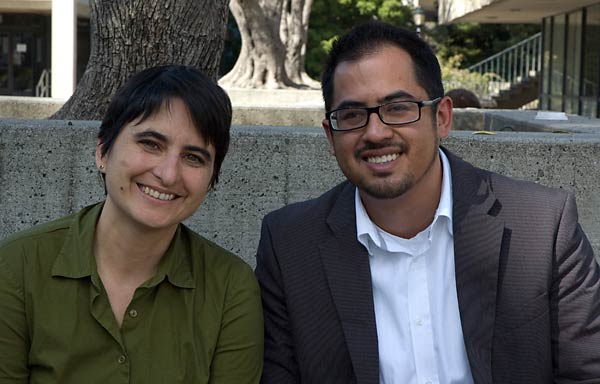 CSAC members Roia Ferrazares and Fabrizio Mejia (Wendy Edelstein/UC Berkeley)
CSAC members Roia Ferrazares and Fabrizio Mejia (Wendy Edelstein/UC Berkeley)The concerned employee's guide to face time at California Hall
| 02 October 2009
BERKELEY — Want to learn about Berkeley's policymaking process, offer input to campus decisionmakers, and get to know other concerned staff? The Chancellor's Staff Advisory Committee (CSAC), a 16-person board that provides top administrators with employee perspectives on procedures and policies affecting staff, is recruiting new members.
How to get a seat at the table
CSAC is holding information sessions for potential applicants, to explain its structure, mission, and goals. Both sessions — one on Wednesday, Oct. 7, at 12 p.m., and another on Thursday, Oct. 15, at 3p.m. — will be held in 200 California Hall. Additional application-writing workshops are also scheduled. For details, visit csac.chance.berkeley.edu.
Applications for CSAC membership will be accepted through Monday, Oct. 26, at 5 p.m. Questions should be directed to CSAC Chair Teresa Trice at 642-5789.Terms on CSAC run three years; new members will start in January 2010. Participation requires an understanding supervisor, since the time commitment ranges from three to six hours a week, depending upon a member's level of involvement (committee chairs and members of CSAC's executive team typically log more hours). All non-academic career employees are eligible to apply.
Fabrizio Mejia, interim director of Student Life Advising Services, says his four years of CSAC service have helped him "develop political acumen and also learn how to speak and understand the different languages of administrators and faculty."
CSAC may be best known for administering the annual Chancellor's Outstanding Staff Awards (COSA), which honor employees and teams who have made noteworthy contributions to the campus community. Yet "COSA is just a small slice of what we do," says CSAC member Roia Ferrazares, office manager in the College of Letters and Science dean's office.
Each year, CSAC identifies issues of concern to employees; this year its focus is on improving the administration's communications to staff. Although Mejia says he doesn't always agree with Berkeley's top administrators, hearing the rationales behind their decisions is helpful, and the committee has suggested in its meetings with the senior administration that they share such information with the campus at large.
Conveying empathy?
CSAC is assessing how the administration conveys empathy for Berkeley's beleaguered staff, who have been hit this year with salary cuts, furloughs, and layoffs. Asked whether he thinks California Hall's inhabitants empathize with the plight of campus staff, Mejia says, "I think so. Though if I weren't on CSAC, I probably would say 'no.' The opportunity that we have to sit in front of these folks humanizes them … and vice versa."
CSAC applicants are asked to write three short essays in which they identify campus issues of importance and suggest ways to address them. In addition, the committee weighs how applicants fit into its diversity goals. A group interview involving five candidates who are tasked with discussing a campus issue is the final step in the process. "How well do they work in a group?" asks Ferrazares. "If collaboration breaks down, then a committee becomes ineffective."
"I think there's a misperception that you have to be polished and comfortable speaking in front of people" to join CSAC, says Mejia. Although some staff come to CSAC with those attributes, others develop them through their experience on the committee. Says Mejia: "Those are the people who we want to have apply."

